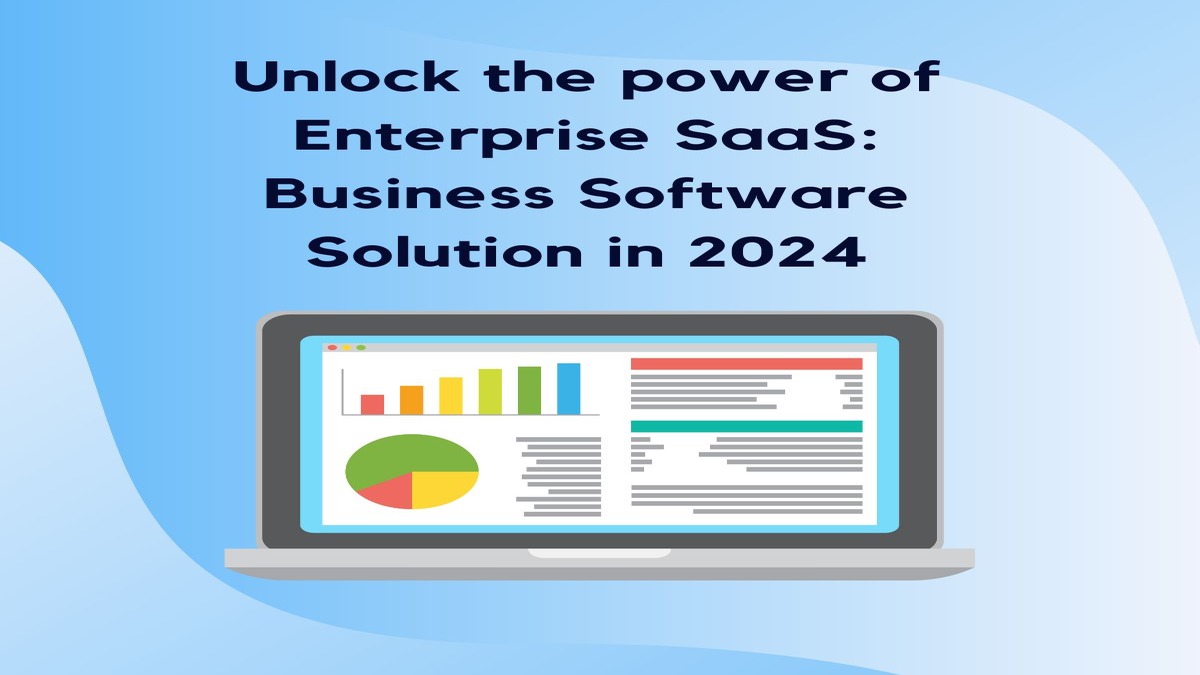Enterprise Software as a Service (SaaS) is transforming how businesses operate. This cloud-based model delivers software over the internet, enabling organizations to access applications without the need for extensive hardware or complex installations. In this article, we’ll delve into what Enterprise SaaS is, its benefits, how it works, and its impact on modern businesses.
What is Enterprise SaaS?
Enterprise SaaS is a subscription-based software delivery model where applications are hosted by a service provider and made available to customers over the internet. Unlike traditional software that requires installation on individual devices, SaaS applications are accessed via web browsers, making them highly convenient and flexible.
Key Features of Enterprise SaaS
- Accessibility: SaaS applications let you access your software from any device with an internet connection, so you can work from anywhere, whether you’re at the office, at home, or on the go.
- Scalability: SaaS solutions can easily scale to accommodate growing business needs. Companies can add or remove users without worrying about infrastructure limitations.
- Automatic Updates: Service providers handle all updates and maintenance, ensuring that users always have access to the latest features and security enhancements without the need for manual upgrades.
- Cost Efficiency: SaaS eliminates the need for expensive hardware and reduces IT maintenance costs, as the service provider manages the infrastructure and software.
- Integration: Many SaaS applications offer APIs and integration capabilities, allowing businesses to connect various tools and systems seamlessly.
Benefits of Enterprise SaaS
- Lower Initial Costs: With a subscription-based model, businesses avoid the large upfront costs associated with traditional software purchases. This pay-as-you-go approach is financially attractive, especially for startups and small businesses.
- Faster Deployment: SaaS applications are typically ready to use shortly after subscription, eliminating the lengthy installation and configuration processes of traditional software.
- Enhanced Collaboration: SaaS applications often come with collaboration features that allow teams to work together in real-time, improving productivity and communication.
- Automatic Updates and Maintenance: Businesses no longer need to worry about software updates and maintenance, as the SaaS provider handles these tasks, ensuring that the software is always up-to-date.
- Scalability and Flexibility: SaaS solutions can easily scale with business growth. Companies can add or remove users as needed and quickly adapt to changing demands.
- Improved Security: Reputable SaaS providers invest heavily in security measures to protect their clients’ data. This includes regular security updates, data encryption, and compliance with industry standards.
How Enterprise SaaS Works
- Subscription Model: Businesses subscribe to a SaaS application on a monthly or annual basis. This subscription fee covers the cost of using the software, maintenance, and updates.
- Web-Based Access: Users access the SaaS application through a web browser. This eliminates the need for software installation on individual devices.
- Centralized Hosting: The SaaS provider hosts the application on their servers. This centralized hosting ensures high availability and reliability, as the provider manages server maintenance and uptime.
- Multi-Tenancy: Many SaaS applications use a multi-tenant architecture, meaning one version of the software is shared among multiple customers. This efficient use of resources allows providers to offer cost-effective solutions.
Impact of Enterprise SaaS on Businesses
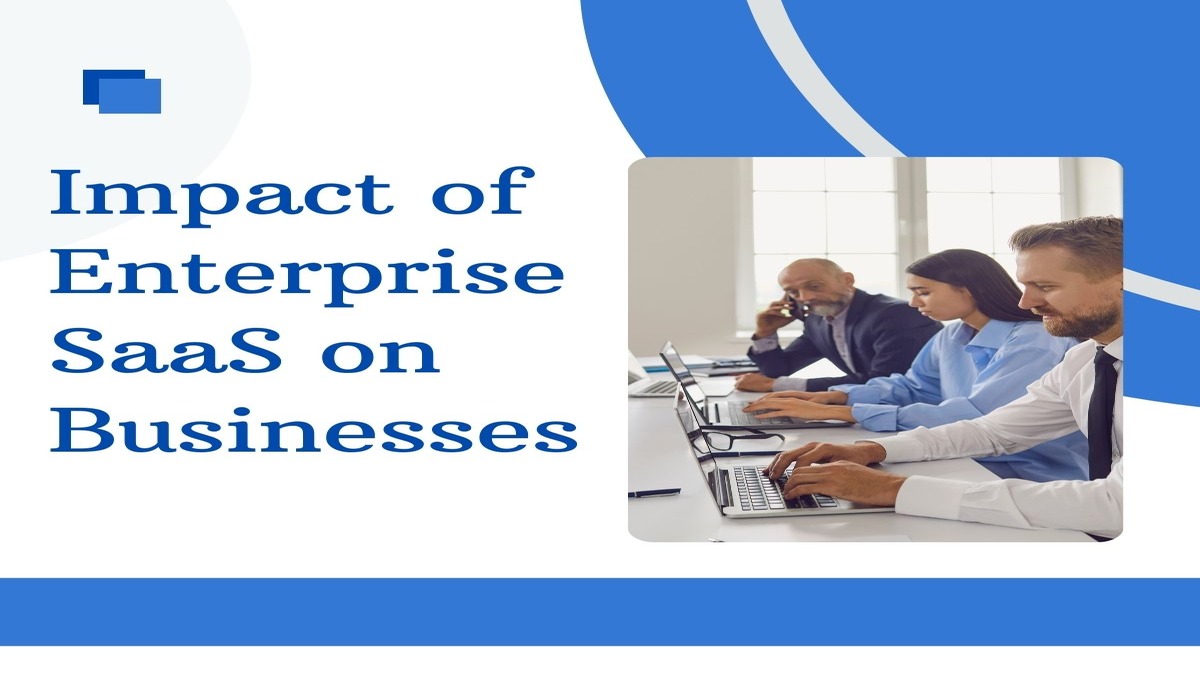
- Increased Agility:SaaS helps businesses quickly adapt to market changes and customer needs. The ability to scale and adapt without significant infrastructure changes enhances business agility.
- Focus on Core Activities: By outsourcing software maintenance and updates to the SaaS provider, businesses can focus on their core activities and strategic initiatives rather than IT management.
- Access to Advanced Technologies: SaaS providers continually update their offerings with the latest technological advancements, allowing businesses to leverage cutting-edge tools and features.
- Enhanced Collaboration: SaaS applications often include collaboration features that facilitate teamwork and communication, leading to improved productivity and innovation.
- Global Reach: SaaS enables businesses to operate on a global scale, as applications can be accessed from anywhere in the world. This is particularly beneficial for companies with remote teams and international clients.
How to Choose the Right Enterprise SaaS Product
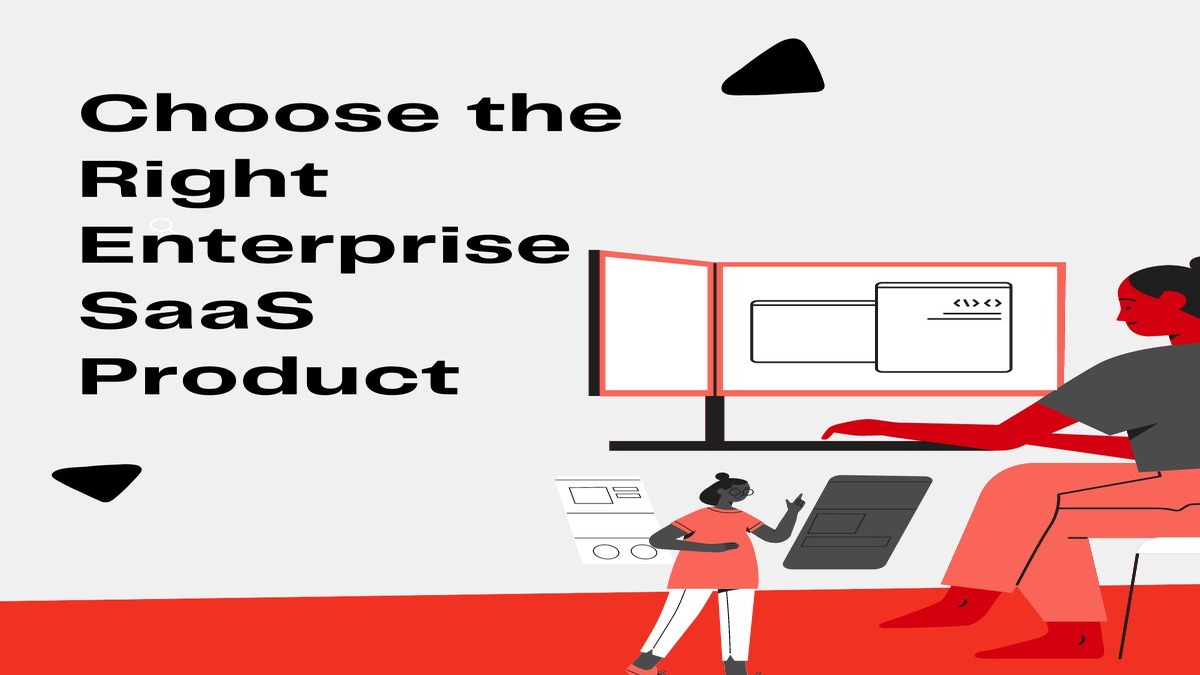
Choosing the right Enterprise SaaS product for your business is a crucial decision that can significantly impact your operations and success. Here’s a simple guide to help you make the best choice, with practical steps and considerations.
- Identify Your Needs
To choose the right Enterprise SaaS product, start by identifying your business’s needs. Consider your challenges and goals—whether it’s improving collaboration, streamlining processes, or enhancing customer management. List and prioritize these needs to guide your decision.
- Set a Budget
Set a budget. SaaS products vary in price, so knowing your spending limit will help narrow your options. Consider both initial and long-term costs, and look for a good balance of features and affordability.
- Research and Shortlist
Research SaaS products that fit your needs and budget. Read reviews, seek recommendations, and explore industry forums. Create a shortlist noting key features, pros, and cons.
- Evaluate Features and Benefits
Compare the features of each product on your shortlist. Focus on how each feature aligns with your business needs. Some key features to look for include:
- Ease of Use: Is the interface user-friendly?
- Scalability: Can the product grow with your business?
- Integration: Does it work smoothly with your current tools?
- Customization: Can it be customized to fit your specific needs?
- Security: Are there robust security measures in place?
- Check for Customer Support
Good customer support is crucial. Choose SaaS products with comprehensive options like live chat, phone support, and documentation. Check user reviews and testimonials for quality.
- Request Demos and Trials
Take advantage of free trials or demos offered by most SaaS providers. Involve your team, gather feedback, and assess how well the product fits your workflow and needs.
- Consider Long-Term Viability
Choose a reputable SaaS provider with a strong track record, financial stability, and a commitment to ongoing development and support.
- Read the Fine Print
Before deciding, read the terms, SLAs, and privacy policies. Understand cancellation terms, data ownership, and data handling.
- Seek Feedback from Current Users
If possible, speak with current users of the SaaS product. Their insights can provide valuable information about real-world performance, reliability, and any potential issues.
- Make Your Decision
Once you’ve considered all the factors, make a well-informed decision. Choose the SaaS product that best meets your business needs, fits your budget, and offers the features and support you require.
Enterprise SaaS Trends in 2024
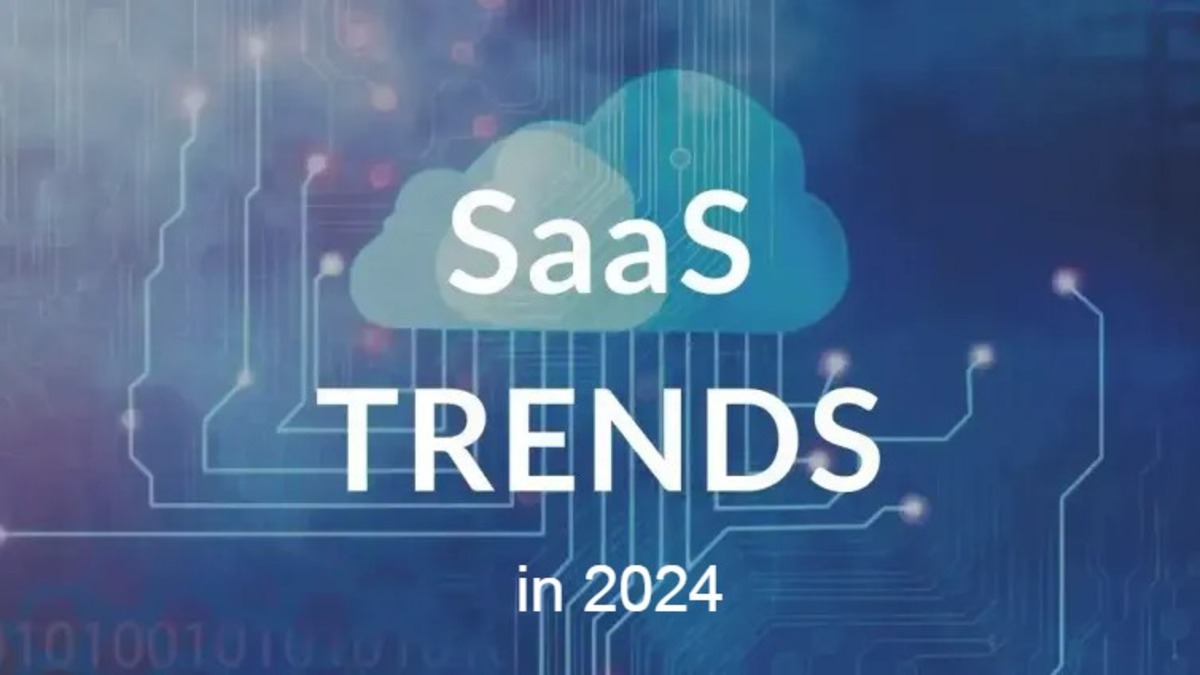
As we move through 2024, several key trends are shaping the landscape of enterprise SaaS:
- AI and Automation: Businesses are increasingly adopting AI-driven solutions for tasks like data analysis, customer support, and workflow automation. This trend helps companies improve efficiency and decision-making.
- Integration and Interoperability: Enterprises are focusing on integrating SaaS tools with their existing systems. Seamless interoperability between applications is crucial for streamlining processes and improving overall productivity.
- Enhanced Security Measures: With rising cyber threats, there’s a strong emphasis on advanced security features. SaaS providers are prioritizing robust data protection, compliance, and threat detection capabilities.
- Personalized User Experiences: Companies are looking for SaaS solutions that offer customizable and personalized user experiences. Tailoring software to specific business needs helps enhance user satisfaction and engagement.
- Scalable Solutions: As businesses grow, they need scalable SaaS solutions that can easily expand with them. Providers are focusing on offering flexible and scalable options to accommodate growth and changing requirements.
- Focus on Data Analytics: Data-driven decision-making is more important than ever. SaaS platforms are integrating advanced analytics tools to help businesses gather insights and make informed decisions.
- Subscription Flexibility: Enterprises are seeking more flexible subscription models, including usage-based pricing and customizable plans. This enables companies to match costs with their specific needs and usage patterns.
- Remote Work Support: The shift to remote work continues, and SaaS solutions that support remote collaboration, communication, and project management are in high demand.
How to Target Enterprise Customers
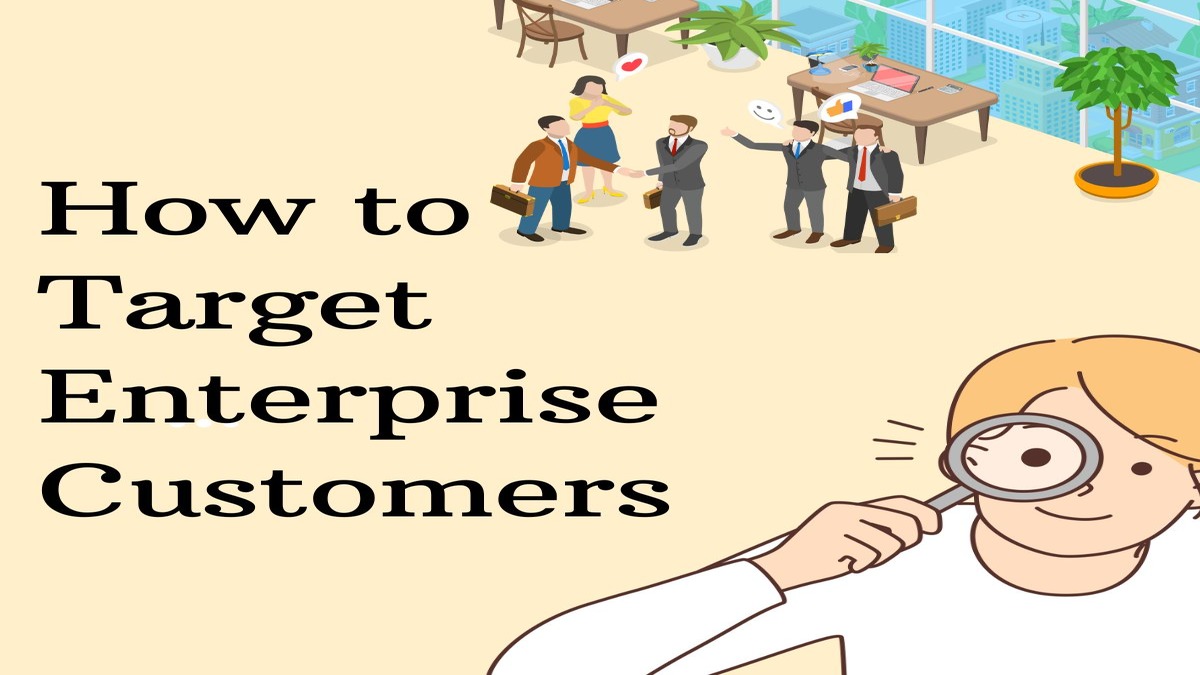
Reaching enterprise customers requires a thoughtful approach. Here’s a simple guide to help you effectively target this audience:
- Understand Their Needs: Study their industry challenges and goals, and customize your messaging to address them directly.
- Build Relationships: Enterprise sales involve multiple decision-makers. Build strong relationships with key stakeholders through networking, industry events, and professional platforms.
- Offer Customized Solutions: Enterprises need tailored solutions. Show how your product can be customized and integrated with their existing systems.
- Showcase Your Value: Show the value of your product with case studies and data-driven results, highlighting measurable benefits for similar companies.
- Provide Exceptional Support: Enterprise customers expect top-notch support. Provide thorough onboarding, dedicated account management, and responsive service.
- Focus on Security and Compliance: Enterprises prioritize security and compliance. Ensure your product meets industry standards and regulations, and clearly communicate these aspects to potential customers.
- Leverage Thought Leadership: Position your company as a thought leader in the industry. Share insights, publish relevant content, and contribute to discussions to build credibility and attract enterprise interest.
Top 5 Enterprise SaaS Companies
Here we provide 5 SaaS Companies list.
- Salesforce
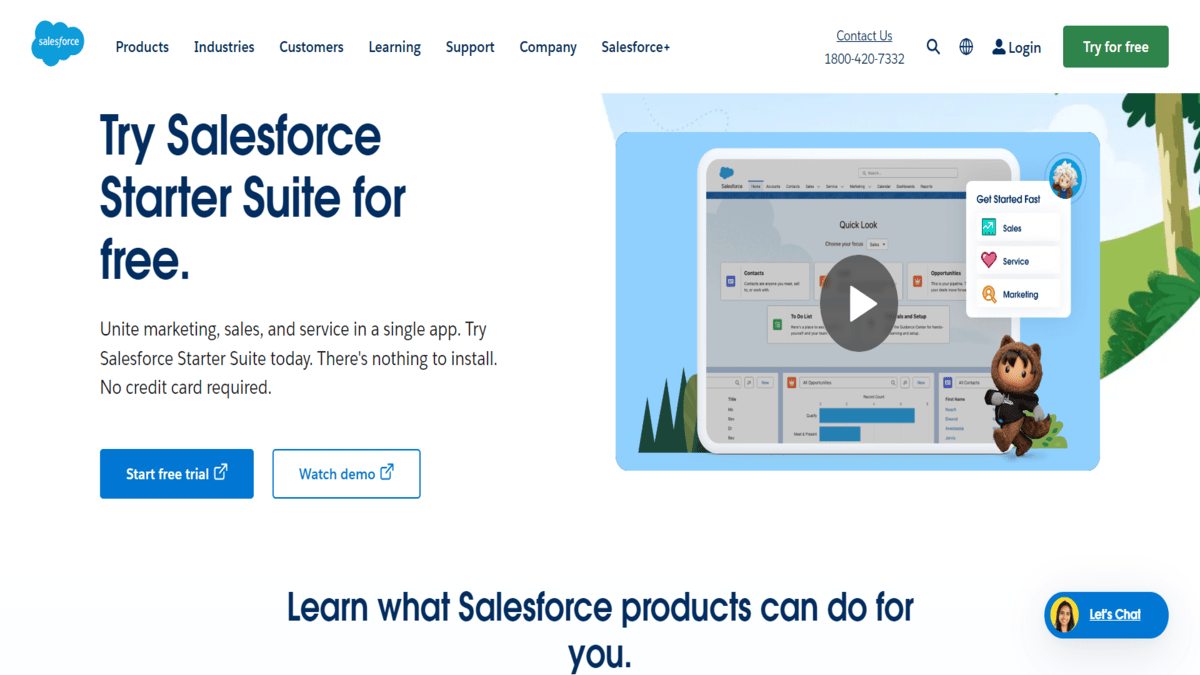 Salesforce is a cloud-based customer relationship management (CRM) platform that helps businesses manage and analyze customer interactions and data. It offers a range of tools for sales, marketing, customer service, and more, designed to improve customer relationships, streamline processes, and boost productivity. Salesforce allows businesses to track sales leads, manage customer information, automate marketing campaigns, and provide better service through its various applications and integrations.
Salesforce is a cloud-based customer relationship management (CRM) platform that helps businesses manage and analyze customer interactions and data. It offers a range of tools for sales, marketing, customer service, and more, designed to improve customer relationships, streamline processes, and boost productivity. Salesforce allows businesses to track sales leads, manage customer information, automate marketing campaigns, and provide better service through its various applications and integrations.
- Website: Salesforce
- Microsoft 365
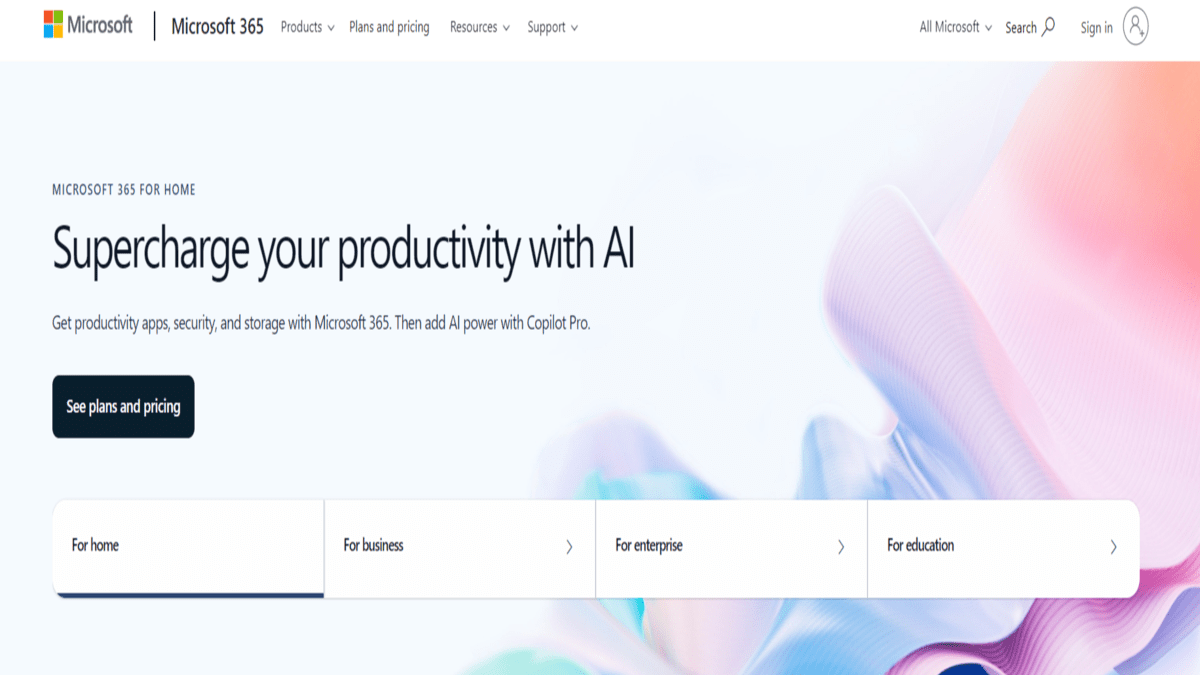 Microsoft 365 is a cloud-based suite of productivity tools and services offered by Microsoft. It includes familiar applications like Word, Excel, PowerPoint, and Outlook, along with cloud storage via OneDrive and collaboration tools such as Teams and SharePoint. Microsoft 365 is designed to enhance productivity, facilitate communication, and enable seamless collaboration across devices and locations. It also offers advanced security features and regular updates to ensure users have access to the latest tools and capabilities.
Microsoft 365 is a cloud-based suite of productivity tools and services offered by Microsoft. It includes familiar applications like Word, Excel, PowerPoint, and Outlook, along with cloud storage via OneDrive and collaboration tools such as Teams and SharePoint. Microsoft 365 is designed to enhance productivity, facilitate communication, and enable seamless collaboration across devices and locations. It also offers advanced security features and regular updates to ensure users have access to the latest tools and capabilities.
- Website: Microsoft 365
- SAP
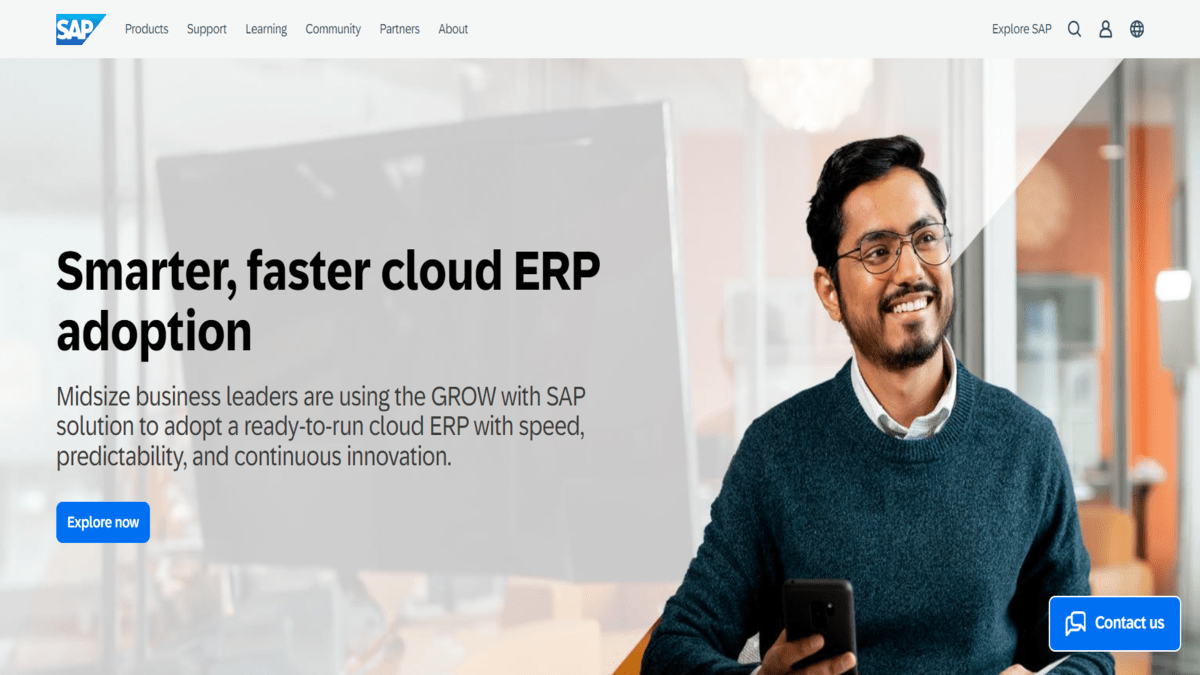 SAP (Systems, Applications, and Products in Data Processing) is a global leader in enterprise software and services. It provides integrated solutions for managing various business processes, including finance, human resources, supply chain, procurement, and customer relations. SAP’s software helps organizations streamline operations, improve efficiency, and make data-driven decisions through its extensive suite of applications and platforms. Notable products include SAP ERP, SAP S/4HANA, and SAP Business Technology Platform.
SAP (Systems, Applications, and Products in Data Processing) is a global leader in enterprise software and services. It provides integrated solutions for managing various business processes, including finance, human resources, supply chain, procurement, and customer relations. SAP’s software helps organizations streamline operations, improve efficiency, and make data-driven decisions through its extensive suite of applications and platforms. Notable products include SAP ERP, SAP S/4HANA, and SAP Business Technology Platform.
- Website: SAP
- Oracle Cloud
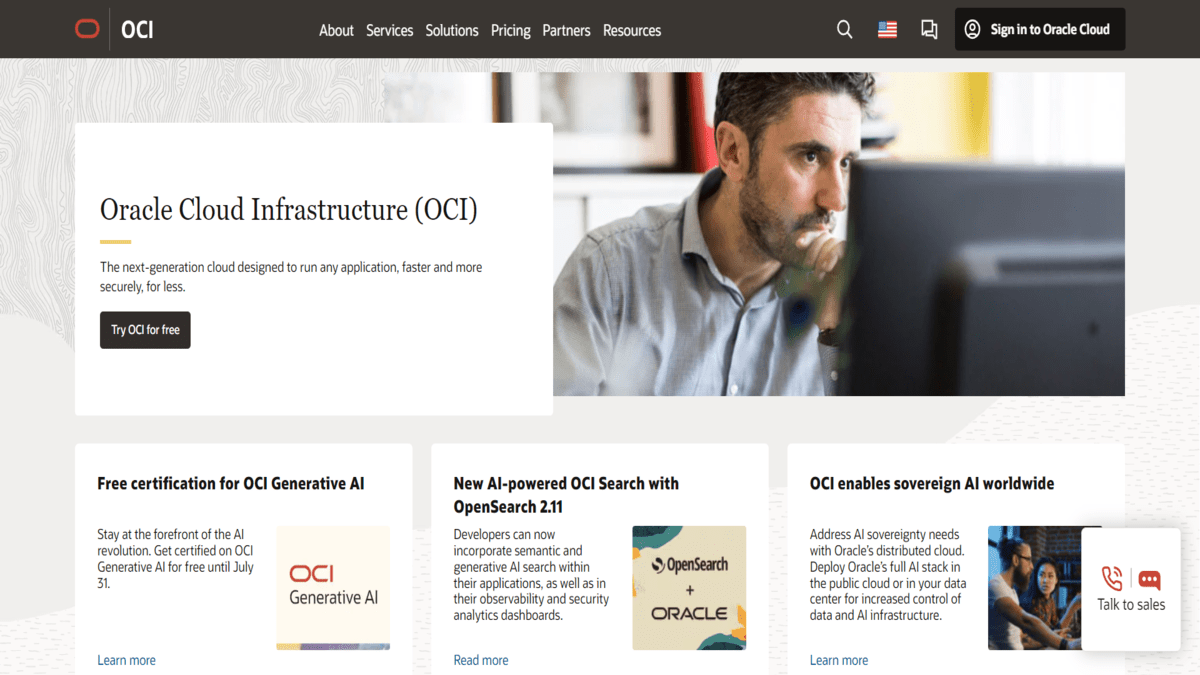 Oracle Cloud is a comprehensive suite of cloud computing services provided by Oracle Corporation. It offers a wide range of solutions, including Infrastructure as a Service (IaaS), Platform as a Service (PaaS), Software as a Service (SaaS), and Data as a Service (DaaS). Oracle Cloud enables businesses to run applications, store and analyze data, and build and deploy new applications. Key features include scalable computing power, advanced data management, integrated security, and support for various programming languages and frameworks. Oracle Cloud is designed to help organizations reduce IT complexity, lower costs, and innovate faster.
Oracle Cloud is a comprehensive suite of cloud computing services provided by Oracle Corporation. It offers a wide range of solutions, including Infrastructure as a Service (IaaS), Platform as a Service (PaaS), Software as a Service (SaaS), and Data as a Service (DaaS). Oracle Cloud enables businesses to run applications, store and analyze data, and build and deploy new applications. Key features include scalable computing power, advanced data management, integrated security, and support for various programming languages and frameworks. Oracle Cloud is designed to help organizations reduce IT complexity, lower costs, and innovate faster.
- Website: Oracle Cloud
- Workday
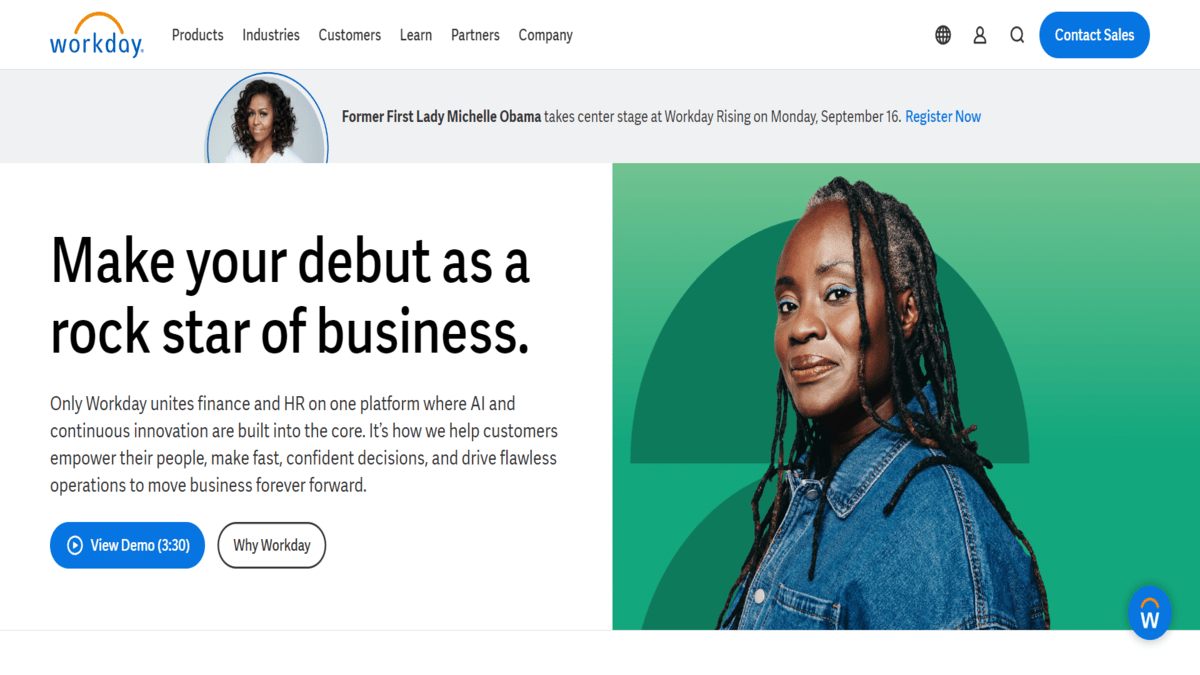 Workday is a cloud-based software vendor specializing in enterprise applications for finance and human resources. It provides a comprehensive suite of tools for managing financial operations, human capital management (HCM), payroll, talent management, and analytics. Workday is designed to help organizations streamline their business processes, enhance workforce productivity, and gain insights through data-driven analytics. Its user-friendly interface and unified platform allow for real-time data access and reporting, making it a popular choice for medium to large-sized businesses looking to modernize their HR and financial operations.
Workday is a cloud-based software vendor specializing in enterprise applications for finance and human resources. It provides a comprehensive suite of tools for managing financial operations, human capital management (HCM), payroll, talent management, and analytics. Workday is designed to help organizations streamline their business processes, enhance workforce productivity, and gain insights through data-driven analytics. Its user-friendly interface and unified platform allow for real-time data access and reporting, making it a popular choice for medium to large-sized businesses looking to modernize their HR and financial operations.
- Website: Workday
Conclusion
Enterprise SaaS has revolutionized the way businesses operate by providing flexible, cost-effective, and scalable software solutions. With its numerous benefits, including lower initial costs, faster deployment, and enhanced collaboration, SaaS is an attractive option for organizations of all sizes. As technology continues to evolve, the adoption of Enterprise SaaS is expected to grow, further transforming the business landscape and enabling companies to achieve greater efficiency and innovation.
FAQs
1. What is Enterprise SaaS?
Answer: Enterprise SaaS (Software as a Service) refers to cloud-based software solutions designed for large organizations. Unlike traditional software, SaaS is delivered over the internet and managed by a third-party provider. It offers scalable, subscription-based access to software, eliminating the need for on-premises installations and maintenance.
2. What are the main benefits of using Enterprise SaaS?
Answer: The main benefits include reduced IT costs, easy scalability, automatic updates, and accessibility from anywhere with an internet connection. SaaS also allows businesses to quickly implement new features and integrations.
3. How does Enterprise SaaS differ from traditional software?
Answer: Traditional software requires installation on local servers and devices, while SaaS is hosted in the cloud and accessed via a web browser. SaaS offers ongoing updates, support, and easier scalability, whereas traditional software often involves significant upfront costs and maintenance.
4. What types of Enterprise SaaS products are available?
Answer: Enterprise SaaS products cover a wide range of business functions, including customer relationship management (CRM), enterprise resource planning (ERP), human resources management, collaboration tools, and project management.
5. How secure is Enterprise SaaS?
Answer: Security varies by provider, but reputable Enterprise SaaS solutions offer robust security measures such as encryption, regular security updates, and compliance with industry standards. It’s important to review a provider’s security policies and certifications.
6. What should businesses consider when choosing an Enterprise SaaS provider?
Answer: Businesses should consider factors like the provider’s reputation, security features, scalability, integration capabilities, customer support, and overall cost. It’s also important to evaluate how well the software meets specific business needs.
7. Can Enterprise SaaS solutions be customized?
Answer: Many Enterprise SaaS solutions offer customization options to tailor the software to specific business needs. Customization can include adapting features, workflows, and integrations to fit unique organizational requirements.
8. How is pricing typically structured for Enterprise SaaS?
Answer: Pricing for Enterprise SaaS is often subscription-based, with options for monthly or annual payments. Some providers offer tiered pricing models based on features, number of users, or usage levels.
9. What are the typical deployment times for Enterprise SaaS?
Answer: Deployment times for Enterprise SaaS can vary, but they are generally quicker than traditional software. Many solutions can be up and running within weeks, depending on the complexity of the implementation and customization required.
10. What support options are available with Enterprise SaaS?
Answer: Enterprise SaaS providers usually offer various support options, including online documentation, customer service via email or phone, live chat, and dedicated account managers. Support availability and quality can vary, so it’s important to review these aspects before choosing a provider.
Read More: Top 10 Leading B2B SaaS Companies in 2024
Related Articles:

